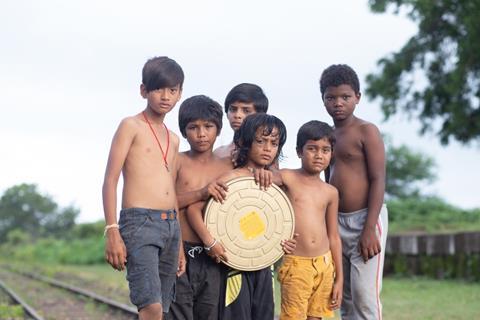Oscar-shortlisted, semi-autobiographical drama witnesses an impoverished Indian boy attempt to escape into cinema

Dir/scr: Pan Nalin. India. 2022. 110min
Last Film Show begins with an expression of gratitude to filmmakers including the Lumiere Brothers, Eadweard Muybridge, Andrei Tarkovsky, Stanley Kubrick and David Lean for “illuminating the path” and ends with hailing an even longer list of film icons. In between lies the semi-autobiographical tale of director Pan Nalin’s own journey to filmmaking that cannily mixes the nostalgic celebration of movies like Giuseppe Tornatore’s Cinema Paradiso with the feel-good underdog trope of innumerable films best highlighted by Danny Boyle’s Slumdog Millionaire.
Poverty depicted as picturesque.
After a world premiere back in pandemic times - 2021 Tribeca – it has since had a healthy festival run including Beijing, Sydney and Palm Springs. It released in Indian theatres on October 14 before landing on Netflix there, and had a limited US run in December. Its appearance on the 15-film shortlist for the Best International Feature Oscar should help Last Film Show travel further.
Samay (Bhavin Rabari) and Fazal (Bhavesh Shrimali) are the Toto and Alfredo of this Indian Cinema Paradiso. A poor boy from Chalala village in Saurashtra, Samay is a representation of Nalin himself. In his spare time, he helps his poor father sell tea at the railway station. A family outing to view a religious film in a ramshackle theatre starts a love affair with cinema that only grows stronger in the company of projectionist Fazal. The play of light and shadow, the many rolls of celluloid and cans of reels fire his dreams of becoming a filmmaker — much to the chagrin of his father (Dipen Raval) who considers cinema a sleazy profession, unfit for the virtuous (like them).
That doesn’t deter Samay from setting up his own DIY theatre with friends, but the going gets difficult with the arrival of computers and a digital projection system. Samay faces an uncertain future, in much the same way as his father, whose business is in peril with the coming of broad-gauge trains that won’t be stopping at the station anymore. Change, then, is the only certainty, be it in life or cinema.
The film starts promisingly. Swapnil S. Sonawane’s camera effectively captures the vignettes of rural childhood, positing the young faces against the landscape, juxtaposing the idyllic with the harsh, as their lives move between the station, home and school, the expansive outdoors and the cramped projection room of the theatre. And Nalin brings in some small but significant details, underlining the inclusivity of Indian cinema and bringing caste, class, religion and community together; such as with the heart-warming camaraderie between a poor upper caste Hindu student of cinema and his equally as poor Muslim projectionist mentor.
But while Nalin is earnest in his intentions, the film ends up feeling too scattered, at one point taking an appreciable but long detour into documenting how projector and celluloid are eventually turned into scrap. The narrative gets needlessly protracted and becomes tonally jarring. Then there are easy contrivances, like the way in which Samay gets Fazal a job at the railways.
This all means that, despite clips from popular Indian films and several nods to the inventiveness of subaltern modes of expression like Tik Tok videos, one can’t quite feel the magic of moving pictures come alive. The bond between Samay and Fazal also lacks the pull of Paradiso’s Toto and Alfredo. While non-professional actor Rabari is likeable as the mercurial, long-locked Mowgli-like Samay, the ensemble around him is not quite as vivid.
In 2019, Rima Das’ Village Rockstars — also India’s official entry to the Oscars — ventured into the same territory of the dreams of an underprivileged child but in a more organic way, flowing with the rhythms of the place in which it was located. Similarly, last year’s Indian entry, PS Vinothraj’s Tamil film Pebbles, was bristling depiction of an precarious, impoverished childhood. Neither of these films made the Academy’s shortlist.
In contrast, the reality depicted in Last Film Show feels overly dressy, with poverty depicted as picturesque. In the outdoor kitchen of Samay’s crumbling house, for example, his mother rustles up elaborate dishes, plated as though being shot for Instagram. Perhaps this approach defines the film’s easy global, appeal; it doesn’t just make privation palatable but eminently watchable.
Production company: Jugaad Motion Pictures, Monsoon Films Private Limited, Stranger 88
International sales: Orange Studio contact.orangestudio@orange.com
Producers: Dheer Momaya, Marc Duale, Pan Nalin
Cinematography: Swapnil S. Sonawane
Production Design: Pan Nalin
Editing: Shreyas Beltangdy, Pavan Bhat
Music: Cyril Morin
Main cast: Bhavin Rabari, Bhavesh Shrimali, Richa Meena, Dipen Raval, Kishan Parmar, Shoban Makwa, Vijay Mer, Rahul Koli, Vikas Bata
























